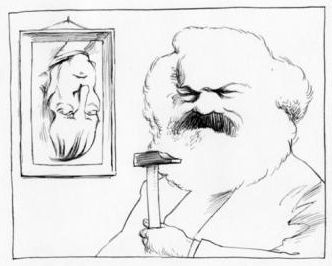‘Inner control is no more a goal than external…if we value the achievements and goals of democracy we must not refuse to apply science to design and construction of cultural patterns, even though we may then find ourselves in some sense in the position of [Orwell’s] controllers.’—Rogers and Skinner, “Some Issues Concerning the Control of Human Behaviour”. [1]
One of the most difficult things to see in this age of constant uncertainty, a never-ending pandemic, wars and rumours of wars is what exactly is happening and why. These occurrences seem random and that there is no option but to endure to the end. However, a principal reason for being unable to see clearly what is going on or any way out is due to our entrapment in the materialist-secularist delusion pervading society, media, education, and government.
This may be the start of a series examining the materialist-secularist framework which is like a computer programme that governs society via producing a mindset that subjugates moral considerations to fear, terror, sickness and death.[2] Perhaps to keep with the times, it should be regarded instead as a global virus that affects and removes the mind from spiritual growth and contemplation into listening to constricting narratives of the mainstream and social media, celebrities who pontificate, the pharmaceutical industry, WHO, and many public announcements that focus on the superficial, fearful, and anxiety inducing. Many moves being made across societies should be questioned such as integrating smart phone technology into all aspects of life which then lead to increased scams and criminality, malware issues, and other social problems; there is also a heightened need to protect children from the harmful fallout from such blindly extravagant technology.
This is worsened by the obsession and craze in enforcing AI upon everyone; though touted as a boon (but proving a bane) to mankind it comes with the most sinister implications and abuse but we are told: live with it.
This attempt at social control and manipulation of people has a schizophrenic effect and creates a cognitive dissonance that does not bode well for mental and other aspects of well-being.
An entry point into the posts of this series would involve a look at the shaping of consciousness as discussed by certain thinkers such as István Mészáros in his Social Structure and Forms of Consciousness, Volume I: The Social Determination of Method. This provides a way into examining the state of society which restricts the exploration of different, countervailing and genuinely enriching ideas than what we are bludgeoned with daily in the mainstream which engenders conformation to the materialist-secularist illusion.
Central to this is the distortion of technology and science into tools of control rather than liberation.
Following each essay is a section exploring its philosophical basis. It is primarily a personal reference for developing ideas; it does not have to be read.
“Men have forgotten God; that’s why all this has happened.”— Solzhenitsyn
Philosophical Crumbs
[The section below is for idea development; it can be skipped.]
The materialist-illusion of the world is difficult to see, and harder to see through, even by those who spend years thinking over such matters. Part of the problem is that so much of the world of ideas has been influenced by materialist thought and while it gives valuable insight it paradoxically obscures what stares us in the face.
A good example is Marx’s critique of capitalism and the philosophical idealism he is opposing (i.e. Hegel). It is also worth examining Marx’s materialism through Althusser’s analysis: the latter’s outlining of Historical Materialism and Dialectical Materialism which form a scientific materialism for Marx. This together with Marx’s expression of his own ideas lead to a materialist political philosophy. The assumption underlying Marx and Althusser is that scientific analysis tends towards the materialist worldview (and vice versa).
Importantly, while a materialistic worldview—underwritten by chance, coincidence, randomness— has been held by many scientists (so they claim in public) the progress of science in significant instances has been due to the exact opposite (e.g. a spiritual motivation for theories etc.). Moreover, this type of explanation for how the world and life works is losing traction as scientific voices are starting to go against the mainstream due to further scientific research, discoveries and evidence: these undermine seriously the random and materialistic conception of reality. More on this in subsequent pieces.
Mészáros’ materialism has similarities to Marx. And Marx’s materialism can be stated broadly as:
(a) The materialistic view is needed to explain the state of the world. It is the opposite of the idealism presented by Hegel. In order to set things right it must be correctly seen that the material takes precedence over consciousness; reality is concrete not abstract as in Hegel; his mission to help solve the world’s problems involves turning Hegel whose thought was upside down, upright.
(b) The materialistic conception of history (the world, economy, etc.) provides the basis for effectively analysing the state of affairs of our life as it reveals the problems created by capitalism. An idealistic (abstract) approach as in Hegel distorts socio-economic exploitation making it an idea in the mind when its effects are quite real and devastating for the masses. The mediation of mind/spirit distracts from the concreteness of our problems in this world.
(c) The materialist approach shows up the reality of the world which is somehow masked by capitalism. Here ambiguity creeps in as capitalism, certainly as Marx presents it, is quite materialistic but somehow his materialist analysis unveils the ills of capitalism. This implies that capitalism in itself does not reveal the materiality of our problems as much as Marx’s analyses and theories do; this is something that lacks clarity in Marx: for capitalism is hardly in sync with idealism, and to its practitioners quite concrete in dealing with socio-economic growth etc. Perhaps for Marx his view accurately frames the issues of socialism/communism contra capitalism that sharply throws into relief the exploitative nature of the latter.
As may be discussed in other pieces, Marx did not read Hegel accurately in that he wilfully twisted much of Hegel to suit his purposes. His comment on the inversion of Hegel was witty in its own way and has certainly led to interesting insights but the latter’s ideas are far too complex and powerful to relegate and ignore. Without Hegel there would be no Marx as we know him. Hegel is the greater thinker and philosopher. It is claimed here that Hegel got most of it right and his influence is such that the accusations and criticisms of his detractors through the years still cannot dim his achievement.
However, the point is that both Marx and Mészáros present a basis of the materialist worldview that is the warp and woof of the materialist-secularist illusion. By highlighting the materiality of existence and how that shapes consciousness they have ironically made clearer not just the materiality of capitalism in its exploitative grandeur but frames how the reigning world order generates the materialist-secularist illusion.[3] So, in examining Mészáros there is a proper understanding of the current illusion we wallow in and may help provide insight into trying to escape it. Through this process it becomes clearer how much is being held back and distorted in the mainstream and public sphere which keeps us stuck in a limited and false conception of the world.
The upshot is that the materiality scrutinised is not about socialism, communism or capitalism as such; it is about the materialism of this world that is promulgated and adhered to in the most debilitating manner: it shuts out proper freedom of expression, discussion, and debate which is a birthright of humanity.
Notes:
The depiction by Bob, the second picture of this piece, is of former Leader of the British Labour Party Jeremy Corbyn. The current Labourites are no better, if not worse; but the current Conservative Party has become a sham under the disastrous Rishi Sunak. Uncannily, the words attributed to Corbyn could be mouthed by many governments (particularly western democracies) with advent of the so-called pandemic.
[1]. Social Structure and Forms of Consciousness, Volume I: The Social Determination of Method, István Mészáros, p30. Monthly Review Press, 2010.
[2]. For more and perhaps greater clarity please see “The metaphysics of atheism”, “The metaverse-crypto entrapment”, and “The invisible hand: The natural order of things”.
[3]. The “materiality of existence” is not meant to be a tautology but an emphasis on the materialist worldview and relegation of idealism. Hegel’s ideas are indeed relevant to what is happening currently but that is for another time.
[Top picture credit of Marx: C.K. Wilde.]
©2024 Sanjay Perera. All rights reserved.









